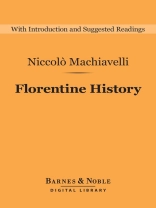This edition includes a modern introduction and a list of suggested further reading.
In
Florentine History Machiavelli wrote about his native city, which he loved with a passion — more than his soul, he said — and by which he was exasperated. He was not just the famously cold, ironic analyst of ruthless power politics, evident in much of his most famous work, The Prince; he had a fervent sense of the common good and how that might be achieved in a republic. For him, Florence had the potential to be one of the greatest of republics, a match for ancient Rome itself, but that potential had never been fulfilled. In the Florentine History Machiavelli explores why not and in the process reveals the dynamic and danger of republican politics — his thinking here, as in all his works, resonating powerfully for us today. The Florentine History is a series of eight essays (known as ‘books’) on the city and its Italian context during the Middle Ages and the Renaissance. They do not follow all the rules of what we see today as professional historical writing — Machiavelli could be as cavalier with the facts as an unscrupulous modern journalist — but they are the fruit of one of the most original minds ever to have been brought to bear on politics.
Про автора
Niccolò Machiavelli was born in Florence in 1469. At the young age of twenty-nine, he entered government service in the city state of Florence as Second Chancellor, a senior post, with responsibilities for relations between Florence and its subject territories in Tuscany and more broadly for foreign affairs. Along with various treatises, plays, and poems, he wrote The Prince (1513), the Discourses (c.1514-1519), the Art of War (1521), and the Florentine Histories (1520-1525). He died in 1527.












